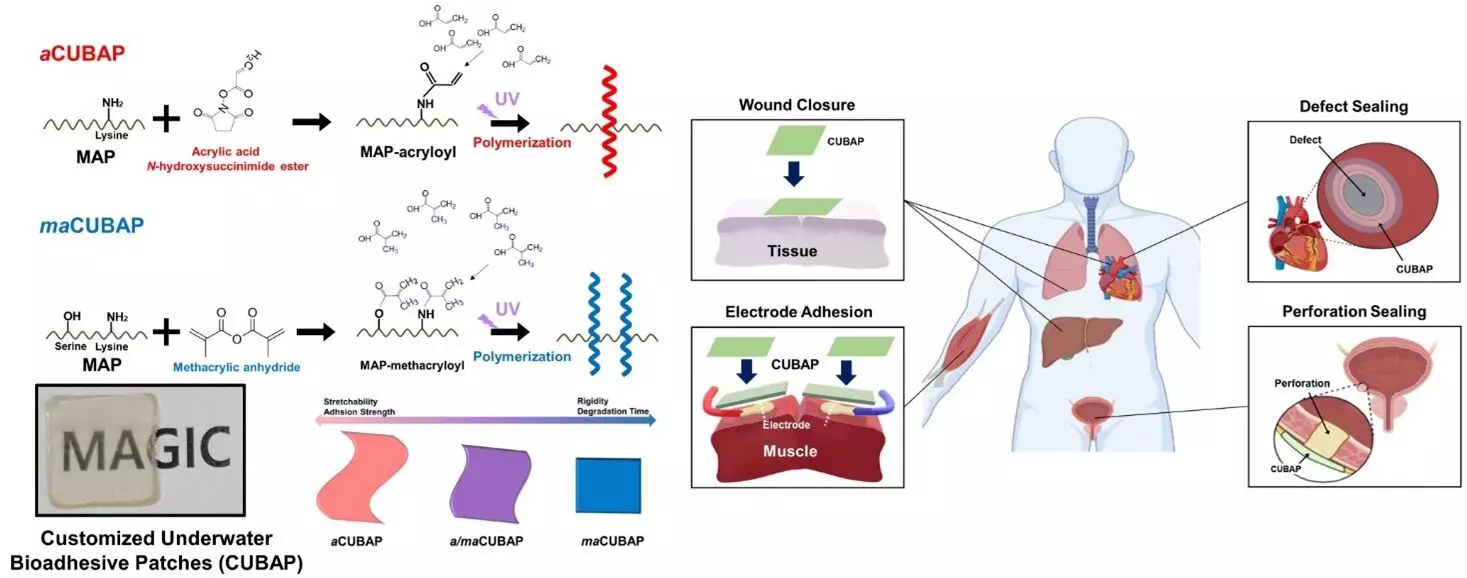The field of adhesives encompasses a vast array of applications, ranging from everyday uses such as sticking paper and fabric together to more specialized purposes like woodwork. However, one area where adhesives play a crucial role is in the medical field. From suturing internal wounds to attaching sensors and implanting medical devices, the use of adhesives is paramount.
In a recent breakthrough, Professor Hyung Joon Cha and his team from Pohang University of Science and Technology (POSTECH) have developed medical adhesives that not only ensure human safety but are also customizable for different organs. Their groundbreaking research focuses on utilizing mussel-derived adhesive proteins to create customized underwater bio-adhesive patches (CUBAP). Published in the journal Advanced Materials, their work offers promising opportunities for sealing internal wounds, leaks, and perforations, ultimately aiding in the healing and regeneration of body organs.
As the field of internal transplant devices expands, the demand for reliable adhesives that can secure these devices in place becomes increasingly critical. Biomedical adhesives used in such applications must possess strong adhesion properties underwater while minimizing any potential side effects. Additionally, the ability to customize factors like biodegradation time becomes vital due to the distinct biological environments of various organs.
Professor Cha and his research team are pioneers in utilizing mussel adhesive proteins for medical adhesives. With the development of CUBAP, they have taken a significant stride in addressing these unique biomedical challenges. The innovative adhesive not only demonstrates exceptional underwater adhesion but is also composed of natural materials, ensuring both safety and biocompatibility within the human body.
By combining mussel adhesive protein with polyacrylic acid and polymethacrylic acid, the team has created customized patches that are currently undergoing clinical evaluation for minimizing scarring in skin closures. In their dry state, these patches are non-adhesive, but once exposed to the human body or other humid environments, they exhibit robust adhesion properties. Furthermore, the researchers can manipulate the degradation time and mechanical hardness by adjusting the ratios of polyacrylic acid and polymethacrylic acid, providing a tailored adhesive system to meet the diverse structural and biological requirements of different organs.
To test the effectiveness of their customized adhesive patches, the research team created three variations and applied them in animal treatments and implants. These patches maintained high adhesion even in highly mobile organs like the heart and bladder, showcasing their exceptional stability. Successful experiments were also conducted on adjusting biodegradation times and flexibility during the transplantation of muscle regeneration electronic devices.
Looking ahead, Professor Cha envisions even more personalized medical applications resulting from their research. He plans to further enhance and refine the process through subsequent studies, aiming to implement these innovative adhesive patches in diverse biomedical fields. The team’s dedication to revolutionizing medical adhesives highlights the potential of customizable underwater bio-adhesive patches as a game-changer in the field of healthcare.
Senior Researcher Hwa Hui Shin from K-MEDI Hub added, “Our study has confirmed the effectiveness and versatility of the developed bio-adhesive patches. These patches open up immense possibilities for medical professionals to address critical wounds and leaks in a safe and customized manner.” The development of CUBAP not only showcases the incredible potential of biomimetic materials but also demonstrates the exciting intersection between adhesive technology and personalized medicine.
The exceptional work carried out by Professor Hyung Joon Cha and his research team presents a significant breakthrough in the field of medical adhesives. Through the creation of underwater bio-adhesive patches, they have opened up new avenues for specialized adhesives that can be tailored to different organs and fulfill specific biomedical needs. As ongoing research and refinement continues, the possibilities for these customized patches are vast and promising, paving the way for personalized medical applications that could revolutionize healthcare practices.


Leave a Reply